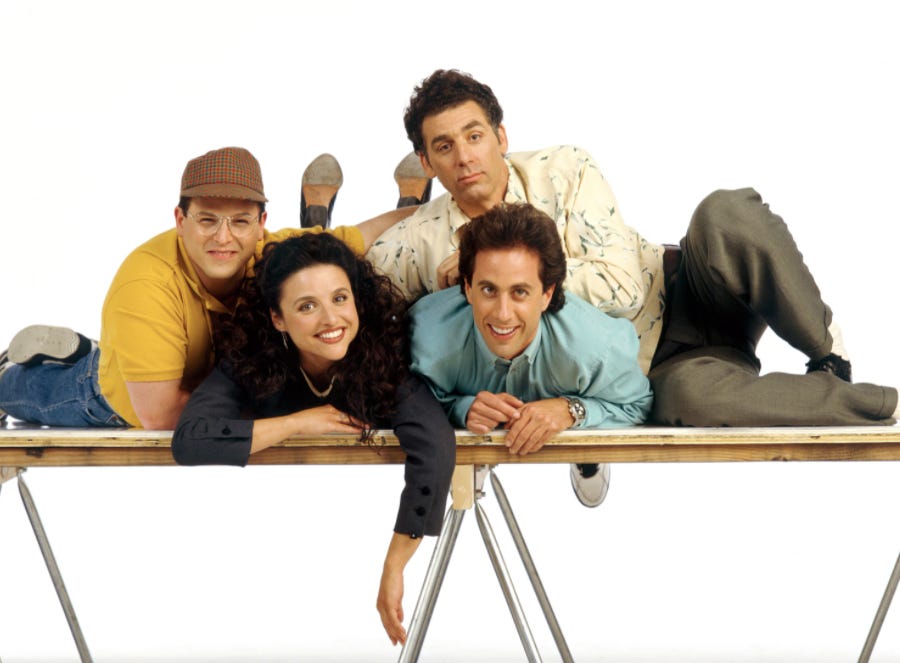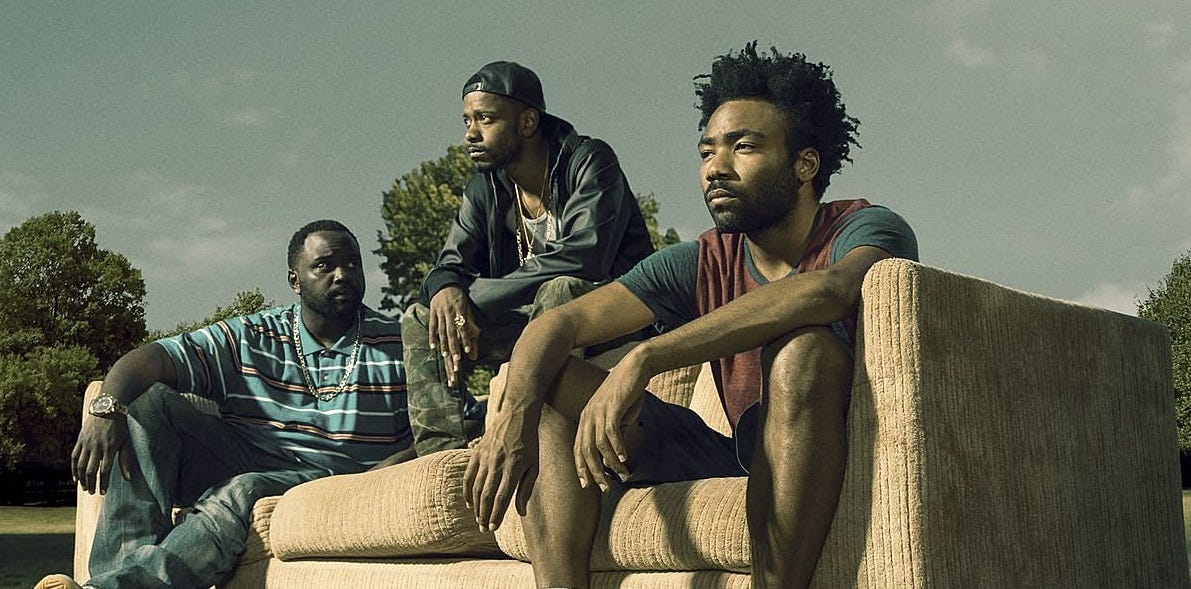From Seinfeld to Atlanta
In which I look at my new obsession 'Seinfeld' and compare it to Donald Glover's 'Atlanta', and try to draw a line between the two shows.
(The Cast of Seinfeld, NBC/Getty Images)
There is something that has to be admitted - before two months ago I had never seen Seinfeld. I knew of it, vaguely, some show set in New York in the 1990s with Jerry Seinfeld at the centre of it, but as a child of the early 21st century I simply never encountered it. Unlike other staples of 90s Americana, like Friends and The Fresh Prince of Bel Air - which I watched countless re-runs of growing up - Seinfeld didn’t seem to gain much traction on the little island just off the coast of American cultural empire that I grew up on. It makes sense then, as somebody who straddles the line between a millennial and a ‘zoomer’ that my first encounter with Seinfeld would be through the streaming behemoth Netflix. Every single episode there for me to be consumed whenever I want, however I want - there are sometimes some small perks to consumer capitalism. As I watched Seinfeld my fascination with it just grew, to the point where I wasn’t just passively ‘consuming content’ anymore but questioning the show itself and what it represented.
And what I’ve learnt from my deep-dive binge of Seinfeld is that - apart from the show swirling around the megalomania of its painfully unfunny, softly misogynistic central character Jerry - this tv show that ran from the years 1989 and 1998 is the perfect embodiment of the end of history. This ‘show about nothing’ - as it self referentially calls the-show-within-the-show ‘Jerry’ in Season 4 - glides effortlessly through the decade in which American led-Capitalism was spreading out worldwide.
In the Seinfeld world there is no horror, no danger, no peril. There are simply the small misadventures of George, Elaine and Kramer who are all met by Jerry’s smug air of indifference. Kramer’s new girlfriend speaks too softly, Jerry can’t decipher a note he wrote, George is incredibly proud of a parking spot he found - these are the issues that consume The Last Men of history as they glide seamlessly through Manhattan. In one episode Elaine tells Jerry that eventually something bad will happen to him, his response is a quick dismissal - no, I’m gonna be just fine, and in this small moment we have the ethos of 1990s Americana. We’ve won and everything is going to be just fine - it’s notable that Seinfeld ended before 9/11 and the wars that followed, before economic collapses that ushered history back into the fore, before the climate around us started breaking down and all the potential horror that will bring. (It’s an interesting thought experiment to wonder had something catastrophic happened during Seinfeld’s run would it have ruptured their blissful liberal bubble).
Nevertheless, this isn’t so say that art, culture, tv and films have to inherently be political, activist or have a ‘message’ at the core of it - indeed, art where that is being forced can be some of the most painful - but it is to say that art of a certain time period encapsulates how people were thinking, how they were feeling better than anything else. In these 20 minute episodes you have a time capsule to a period of incredible optimism, and belief that (hu)man had transcended all the horror that had preceded it. For them, there, then, they stood in the West with history stretching out behind them - Communism had been defeated, diseases and pandemics a thing of the past, mass conscription and wars eradicated, all that is left is consumption and the accumulation of things. That is why watching Seinfeld now is so fascinating, with all that we know and all that we will have to live through. Three decades ago things were so different - Capitalism was swaggering across the world, sweeping nations and cultures alike with the logic of markets - now it staggers along in a zombified form, diminished, disillusioned yet still not defeated, and all the dread that comes with that. It’s difficult, nigh on impossible, to imagine a premise like Seinfeld catching fire in our contemporary socio-political landscape.
(The cast of Atlanta, FOX)
A point of comparison of our collective societal journey from drunken glee at the end of history to living under shadow of decaying late-stage capitalism is Donald Glover’s masterpiece Atlanta. Glover’s Atlanta follows Earn, played by himself much like how Seinfeld plays himself, as he reconnects with his on the verge of celebrity rapper cousin Paper Boi and his eccentric Kramer-like friend Darius. On a surface level Atlanta appears similar to Seinfeld in that it is a ‘show about nothing’ - the Atlanta trio are frequently on their sofa-in-a-field smoking a joint, Earn ponders what flavour a flaming hot-cheeto is (it’s hot, says Darius), the two shows are connected by these moments of irreverence. But where Seinfeld trades in the comfort of the bombastic Atlanta revels in the understated, uneasy surreal as well as engaging us with a reality that we know all too well is there.
When Earn lands himself in prison, awaiting processing, the other inmates and guards share a laugh at an inmate drinking water from the toilet but this moment of levity is quickly interrupted as the guards swarm the inmate and start beating him. Perhaps in the past this scene and our laughter would have ended at the inmate drinking toilet water, our attention quickly diverted away from any realities of the brutality of American life.
In of itself the journey from New York City in the 1990s to Atlanta, Georgia in the mid-2010s reflects the journey that America has made. From floating between Manhattan’s theatres, restaurants and large apartments without a care in the world to flitting between pawn shops, prison and strip clubs, the backdrop of prosperity replaced by poverty. It’s also reflective of where our attention has turned to and how our perceptions have changed, if Seinfeld is the self-perceived best of America than Atlanta is the truth of America - a show where characters grapple with the racialised, violent, capitalist hellscape that exists around them. Whereas Jerry spends most of his time in his Manhattan apartment, feet up (and rather horrifyingly with his shoes on) on the sofa, Earn is homeless and flits between beds and sofas - “not real homeless” he stresses to his cousin. Whereas George’s on-off employment status shuffling through various nondescript office jobs shuffling papers is a recurring joke and doesn’t affect his material wellbeing, in Atlanta the characters are treading water. Van (Earn’s on and off girlfriend) goes through various tribulations to beat a drug-test at work, Earn tells Darius that his daughter needs money immediately, “we’re all just hustlin’” says one side-character.
Perhaps this is the encapsulation of the journey from Seinfeld to Atlanta - Jerry, George, Elaine and Kramer never had to hustle, everybody in Atlanta has no choice but to. Prosperity in the American Empire has dissipated, the wealth has dried up people can no longer float effortlessly engaging only with the mundane. The contemporary American Empire is no longer Seinfeldian, rather it’s Glover’s vision of characters, people swimming against the tide of racialised, winner-takes-all capitalism in attempt to escape poverty, destitution and brutalisation by the state.



